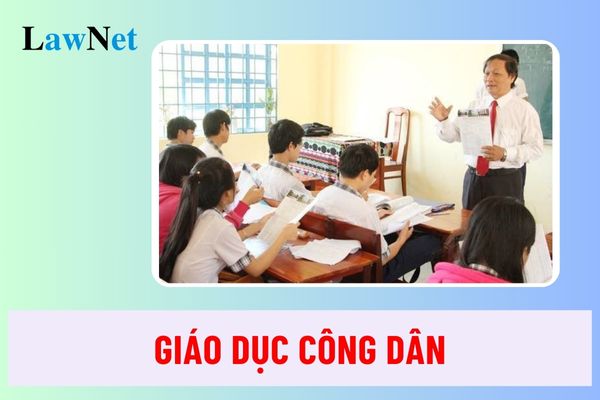What is Civic Education subject according to educational program in Vietnam? What is the duration for implementing the Civic Education program in Vietnam?
What are Civic Education and Ethics subjects according to educational program in Vietnam?
Based on Section 8 of the General Education Program for the subject of Civic Education issued together with Circular 32/2018/TT-BGDDT, civic education is a purposeful and planned educational process that helps students form and develop the essential qualities and core capacities of a citizen, particularly emotions, awareness, belief, behavior, life skills, and the courage to develop and be ready to fulfill their civic duties and responsibilities in the career of building, defending the motherland, and international integration.
Moral education is a purposeful, planned educational process aimed at educating students' awareness and behavior in line with social moral standards and legal regulations; based on that, forming and developing for students the essential moral qualities and core capacities of a Vietnamese citizen, meeting personal development needs and fulfilling civic rights, duties, and responsibilities.
In addition,
- Life skills education is a purposeful, planned educational process to form for students positive actions, healthy behaviors in line with moral standards, and legal regulations to self-recognize, manage, and protect themselves; based on that, forming and developing for students the essential qualities and core capacities of a Vietnamese citizen, meeting personal development needs and fulfilling civic rights, duties, and responsibilities.
- Legal education is a purposeful, planned educational process that helps students become aware and behave according to legal regulations; have general, basic, practical knowledge for life and career orientation regarding the law, based on which forming and developing the essential qualities and core capacities of a Vietnamese citizen, meeting personal development needs and fulfilling civic rights, duties, and responsibilities.
- Economic education is a purposeful, planned educational process that helps students become aware of and engage in economic activities in line with moral standards and legal regulations; have general, basic, practical knowledge for life and career orientation regarding the economy; based on which forming and developing the essential qualities and core capacities of a Vietnamese citizen, meeting personal development needs and fulfilling civic rights, duties, and responsibilities.

What is Civic Education subject according to educational program in Vietnam? What is the duration for implementing the Civic Education program in Vietnam? (Image from the Internet)
What is the duration for implementing the Civic Education program in Vietnam?
Based on Subsection 2 of Section 8 of the General Education Program for the subject of Civic Education issued together with Circular 32/2018/TT-BGDDT, the duration of the Civic Education program is as follows:
Grades 1 - 9: 35 periods
Grades 10 - 12: 70 periods
In upper secondary school, each grade has an additional 35 periods per academic year for elective study topics.
The duration (number of periods) allocated for study topics in upper secondary school, including the time for evaluation, is as follows:
| Name of Study Topic | Grade 10 | Grade 11 | Grade 12 |
| Topic 10.1: Love, Marriage, Family | 10 | ||
| Topic 10.2: Business Models of Small Enterprises | 15 | ||
| Topic 10.3: Some Issues of Criminal Law | 10 | ||
| Topic 11.1: Economic Development and Natural Environmental Changes | 15 | ||
| Topic 11.2: Some Issues of Labor Law | 10 | ||
| Topic 11.3: Some Issues of Civil Law | 10 | ||
| Topic 12.1: Economic Development and Cultural, Social Changes | 10 | ||
| Topic 12.2: Some Issues of Enterprise Law | 10 | ||
| Topic 12.3: Vietnam in the Process of International Economic Integration | 15 |
How to evaluate the results of students regarding the Civic Education subject in Vietnam?
Based on Section 7 of the General Education Program for the subject of Civic Education issued together with Circular 32/2018/TT-BGDDT, the evaluation of the education results for the Civic Education subject is regulated as follows:
The evaluation of education results is to assess the extent of students' achievements in terms of qualities and capacities compared to the requirements for each grade level and study phase to identify positions and acknowledge the progress of each student at a specific point in their development; and simultaneously provide information for teachers to adjust teaching and for educational management agencies to implement program development. The evaluation of educational outcomes must ensure the following requirements:
(1). Combine evaluation through learning tasks (tests in multiple-choice, oral or written forms, practical exercises, essays, presentations, research assignments, projects, etc.) with evaluation through observation of students' attitudes and behaviors during participation in learning activities organized in the classroom, group activities, collective or community activities, and in daily communication and interaction.
Focus on using situational exercises built on the connection of lesson knowledge with practical life, particularly realistic situations, events, problems, and phenomena close to students. Increase the use of open questions linked to real-life practices in test and evaluation assignments to allow students to demonstrate qualities and capacities.
The evaluation through observation of students' attitudes and behaviors during learning and activities at school, home, and in the community should be based on feedback sheets from teachers, students, families, or social organizations.
(2). Combine teacher evaluations with self-assessment and peer assessments among students, parent assessments, and community assessments, in which teacher evaluations are the most important; prioritize evaluating students' progress.
(3). Evaluation results after each semester and the whole academic year for each student are the combined results of process evaluation and summary evaluation according to the guidelines of the Ministry of Education and Training.

